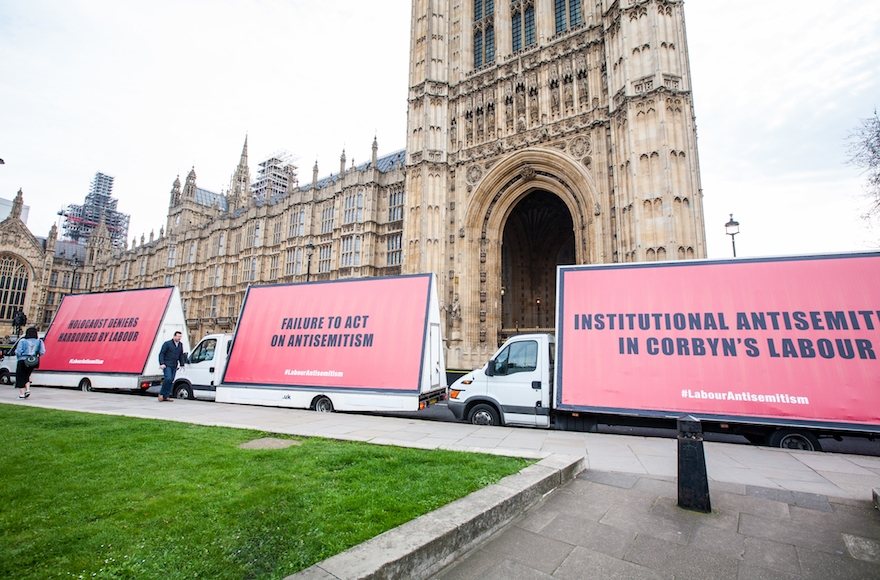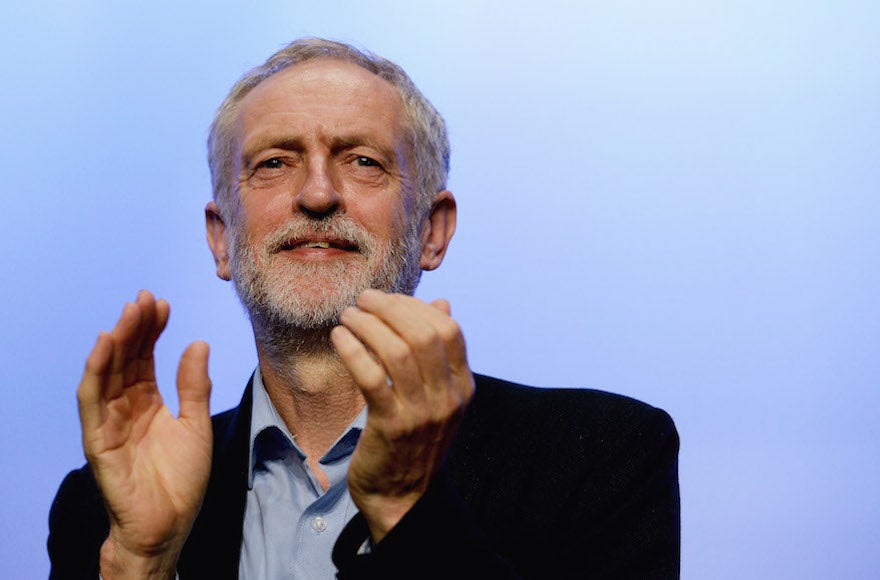‘Three Billboards’-style campaign against anti-Semitism in Labour Party fails to sway Brits
Published April 23, 2018

Van-mounted billboards in central London were the latest escalation in British Jews’ publicized row with Labour leader Jeremy Corbyn. (Courtesy of Jonathan Hoffman)
LONDON (JTA) — Keith Walker was having a sandwich in Parliament Square when he saw something that made him sit up straight and cut short his lunch.
ADVERTISEMENT
What did the 42-year-old activist for disabled people’s rights find so fascinating?
It was three billboards on wheels that circled around the square for several long minutes last week during one of its busiest days of the year. They carried text accusing Labour leader Jeremy Corbyn of tolerating anti-Semitism in the party.
Inspired by the award-winning American film “Three Billboards Outside Ebbing, Missouri,” the billboards were part of a series of unprecedented street protests by British Jews against a leader of the party that used to be their political home.
The April 17 protest coincided with a rare parliamentary debate on anti-Semitism that focused on Labour. During the discussion, Jewish Labour lawmakers like Ruth Smeeth and Luciana Berger recounted the many verbal attacks that they have encountered since 2015, when Corbyn was elected party leader.
The row over anti-Semitism in Labour under Corbyn has been raging for two years inside the party and beyond.
The Board of Deputies of British Jews and other Jewish groups have accused Corbyn, a hard-left politician, of tolerating and at times encouraging expressions of anti-Semitism disguised as anti-Zionism or anti-capitalism by thousands of supporters who joined the party under him.
ADVERTISEMENT
Corbyn has vowed to fight racism. His party has kicked out some members caught engaging in anti-Semitic rhetoric. But under Corbyn — who in 2009 called Hamas and Hezbollah his “friends” whom he said he was “honored” to host in parliament — Labour has also readmitted or refrained from punishing others who made statements perceived as anti-Semitic.

Keith Walker engaging the driver of a van transporting a billboard about anti-Semitism in the Labour Party on London’s Parliament Square, April 17, 2018. (Cnaan Liphshiz)
The signs, which cost $6,300 that organizers raised online from dozens of donors, reflect a new development in the dispute, in which Jewish criticism of Corbyn over anti-Semitism in Labour has moved from Facebook and dinner table conversation onto the street.
But if the organizers of the signs initiative and other street actions in recent weeks have sought to turn Corbyn’s supporters against him over these issues, then they have had only partial results.
“I think it’s a load of bollocks,” an outraged Walker told JTA as he engaged one of the drivers. “Who’s paying you, bruv? Who’d you work for? Is it the Tories or Tony Blair?” he demanded as he snapped pictures of the vans with his cellphone.
Walker’s suggestion that protests by Jews against Corbyn are orchestrated by the ruling Conservative Party or the center-left former leader of Labour is typical of how the allegations are strengthening his popularity with some diehard supporters rather than weakening it.
“It’s obvious, innit, they’re trying to smear him to keep him from redistributing wealth and taking it from the rich to give to the rest of us,” Walker said.

Jonathan Hoffman organized the rolling billboard campaign targeting Corbyn, April 17, 2018. (Courtesy of Hoffman)
Igor Martynowski, a 26-year-old cartoon artist, also was “disgusted” by the protest.
“Instead of doing something with the potential of helping someone, or the environment, they’re just spending money smearing someone else. It’s just sad,” he said about the signs, which spoke about “Holocaust deniers harbored by Labour” and “institutional anti-Semitism in Corbyn’s Labour.”
Carina Garret, a 21-year-old student from Liverpool, said she agreed that Labour has an anti-Semitism problem, “but Corbyn’s not it.” Some of his supporters are the problem, she said. Garret called the initiative of the three signs and other initiatives targeting Corbyn a “distraction” and a “real shame.”
Her schoolmate Dave Aldwinkle said Corbyn’s Jewish critics have “gone too far.”
Aldwinkle and Garret, who are not Jewish, both said they support Corbyn for prime minister.
“He’s an activist, not a politician, and that’s his strength,” Aldwinkle said.
Garret said she could think of no weaknesses or faults preventing Corbyn from being a good prime minister. Aldwinkle said Corbyn at times was “too soft” on his critics instead of “fighting back.”
Amid intense and unprecedented scrutiny by the media over Labour’s anti-Semitism problem, Corbyn won 40 percent of the vote in the 2017 parliamentary elections despite predictions that Prime Minister Theresa May of the Conservative Party would win handily.
But among Jews, Corbyn is so unpopular that some, including Jonathan Hoffman, an organizer of the tree signs initiative and former vice chair of the Zionist Federation of Britain, are saying they would leave Britain if he is elected prime minister.
Last month, hundreds showed up at a rally protesting Labour anti-Semitism organized by the Board of Deputies of British Jews outside Parliament under the banner “Enough is Enough.” On April 8, hundreds of demonstrators gathered at a rowdier rally by a British Jewish group, the Campaign Against Anti-Semitism, in which speakers accused Corbyn personally of being an anti-Semite.
The street-level mobilization follows recent cases in which Corbyn was implicated personally in a speech deemed anti-Semitic, according to Hoffman, who called it a “tipping point.”
Corbyn recently has had to apologize for his 2013 defense of a London mural widely seen as anti-Semitic. It shows stereotypical Jewish men playing Monopoly on the backs of black men. After the media dredged up his Facebook post on the mural, Corbyn deleted it.

Labour Party leader Jeremy Corbyn addressing the TUC Conference in Brighton, England, Sept. 15, 2015. (Mary Turner/Getty Images)
He was also found this year to have been a longtime member, until 2015, of a private Facebook group rife with anti-Semitic hate speech.
“In the past, Corbyn was able to hind behind criticism of Israel to dismiss allegations of anti-Semitism,” Hoffman said. “But the mural had nothing to do with Israel, and Corbyn was personally a member of the anti-Semitic Facebook group.”
In an apparent bid to mollify his Jewish critics, Corbyn on Passover attended a seder dinner — organized, however, by a fringe, far-left group called Jewdas. But even this gesture backfired when the Jewish media highlighted how Jewdas’ Haggadah, the text used during the seder dinner, was an alternative version featuring a prayer for Israel’s destruction.
Whereas Corbyn has shown himself capable of transcending his Jewish detractors in elections, the issue is nonetheless exposing him to scathing criticism within his own party. And it has cost his party several major donors, including Jewish ones, while widening the gulf between Labour centrists who resent Corbyn and those further to the left.
During the parliamentary debate last week on anti-Semitism, Smeeth, the Jewish Labour lawmaker, denounced inaction on anti-Semitism within her own party. She read out in Parliament one of the thousands of anti-Semitic emails she says she has received since 2015.
“Hang yourself, you vile treacherous Zionist filth, you’re a cancer of humanity,” one email said.
She and Berger both received standing ovations in the House of Commons, the Parliament’s lower house, after sharing the abuse they had received.
But even Smeeth conceded that opposition to the alleged proliferation of anti-Semitic rhetoric within Labour is causing some Corbyn supporters – known in Britain as “Corbynistas” — to rally around him.
“For every comment like those you just heard,” she said of the anti-Semitic emails she had read aloud, “you can find 10 people ready to dismiss it, to cry ‘smear,’ to say that we are weaponizing anti-Semitism.”
As the debate grinds on, the Corbyn effect is making itself felt in very tangible ways in some Jewish households in London.
Mark Ruben, a 57-year-old hotelier, recently sold his $7 million property in London, which he called his “dream home,” partly out of concern over Corbyn winning an election and imposing a mansion tax, as his party has vowed to do.
Another consideration in favor of selling, Ruben said, had been the proliferation of anti-Semitic rhetoric and incidents. In 2017, they reached a new record for the second straight year, at 1,382 cases.
“The prospect of Corbyn becoming prime minister is deeply worrisome to me also because of anti-Semitism,” he said. “It’s suppressed now, and he’s denying being anti-Semitic, but it could all be reversed the day he’s in power.”
But the concern of Jews – a population of 250,000 in a country of 65 million — is of little interest to the average voter in Britain, Ruben said.
“We’re just a small minority,” he said. “Even with all the headlines about anti-Semitism, Corbyn will get the Muslim votes, he’ll get the votes of students whose loans he’s promising to repay because he’s offering something that doesn’t exist and they’re too young and naive to realize it.”













